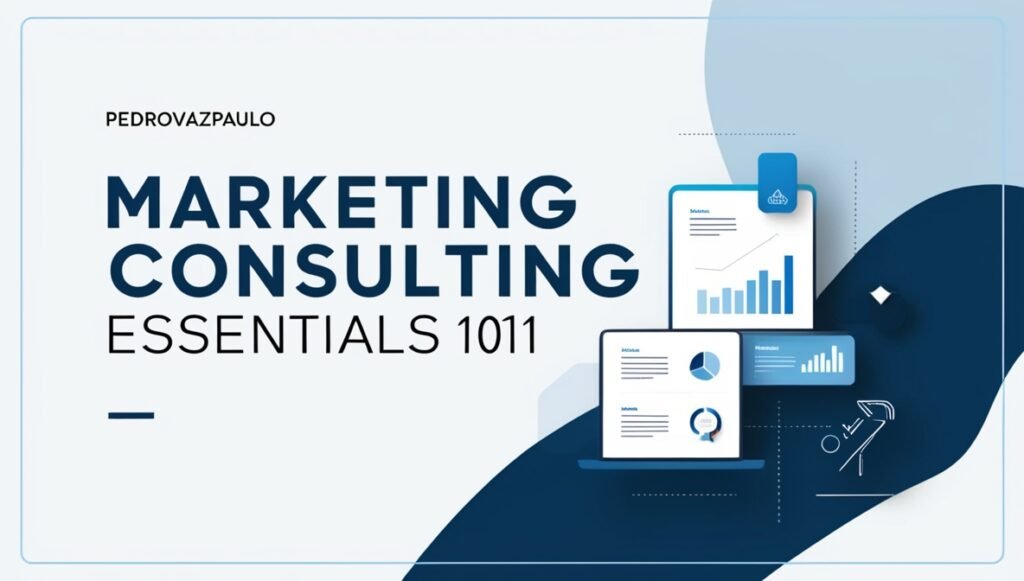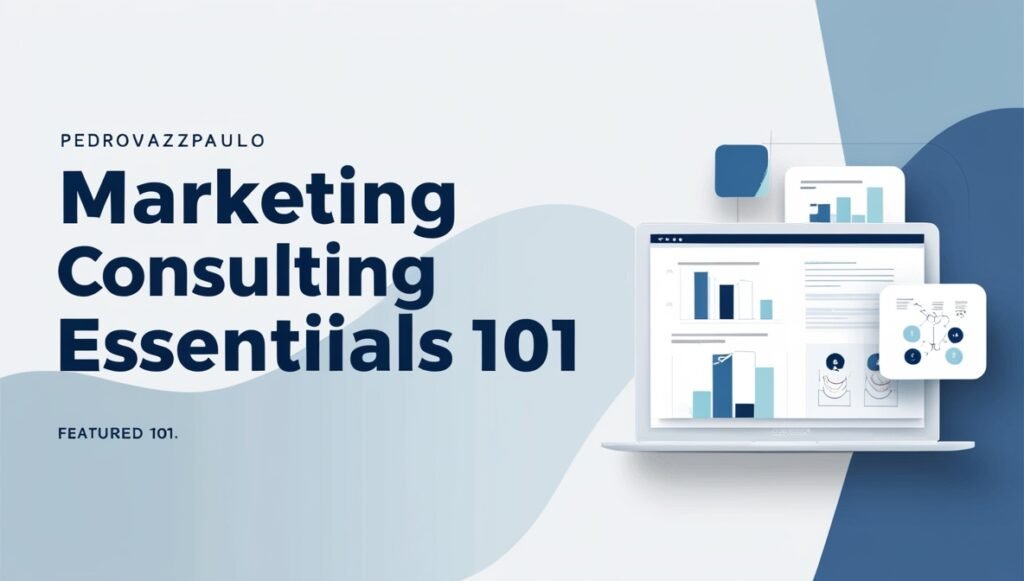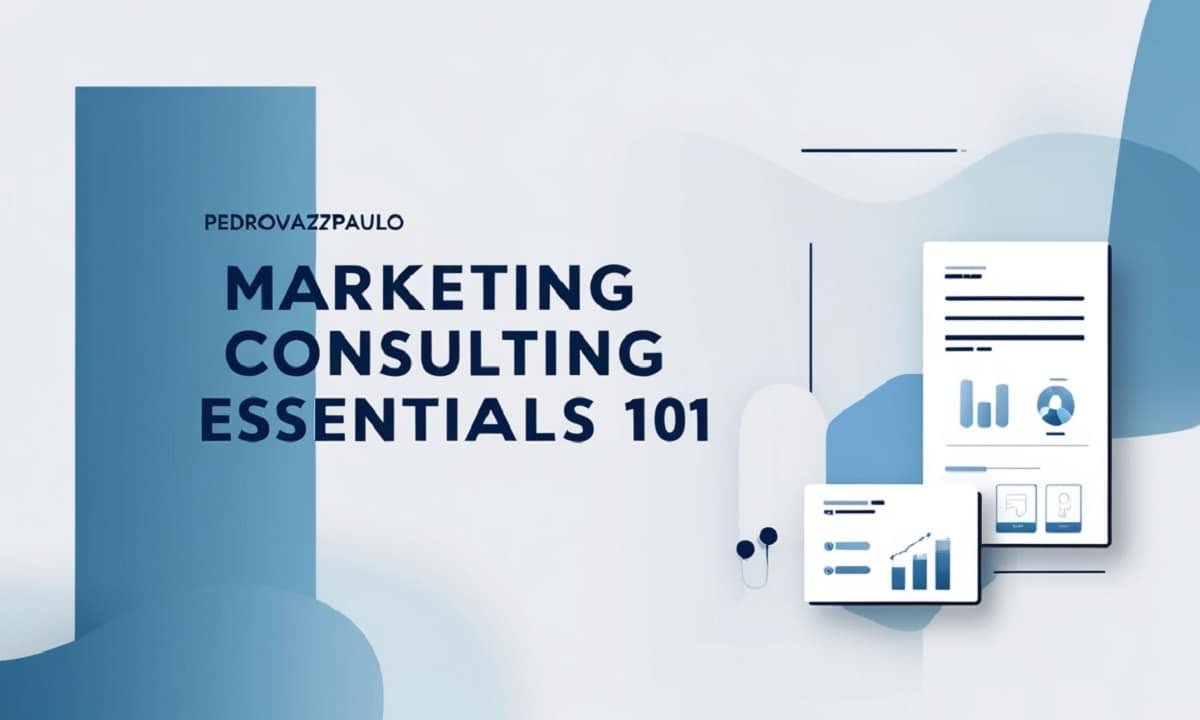The Pedrovazpaulo marketing consulting landscape has transformed dramatically over the past decade. Businesses no longer want bloated agency retainers or cookie-cutter campaigns. They crave agile, specialized expertise that delivers measurable business growth without the overhead. If you’ve contemplated launching a marketing consultant career, you’ve picked the perfect moment.
Companies across every sector need strategic guidance navigating digital marketing, marketing automation, and increasingly complex customer journeys. But success requires more than hanging a shingle and calling yourself an expert. This comprehensive guide reveals everything you need to establish yourself as a sought-after consultant. We’ll explore the essential skills, deliverables, and strategic planning frameworks that separate six-figure practitioners from struggling freelancers.
Decoding the Marketing Consultant Identity
What Marketing Consultants Actually Do Beyond the Buzzwords
A marketing consultant functions as both diagnostician and architect for business transformation. You’re not just executing tactics—you’re identifying growth bottlenecks and engineering solutions.

The role encompasses several distinct functions:
- Strategic audits that expose wasted budget and untapped market opportunities
- Competitive analysis revealing positioning gaps your clients can exploit
- Customer segmentation strategies that increase campaign relevance and ROI
- Marketing automation tools implementation for scalable lead nurturing
- Data-driven decision making frameworks that replace guesswork with evidence
Unlike traditional agencies, consultants typically avoid long-term execution. You design the blueprint; internal teams or specialized vendors handle implementation. This model allows you to impact multiple clients simultaneously while commanding premium rates.
Digital marketing consultants might specialize in PPC campaigns, content marketing, or social media marketing. B2B experts focus on account-based strategies and sales enablement. Franchise marketing specialists ensure brand consistency across hundreds of locations.
The specialization you choose dramatically impacts your earning potential and client acquisition strategy.
When Companies Genuinely Need External Marketing Expertise
Smart businesses recognize when external perspective delivers more value than internal resources. Several scenarios trigger consultant hiring:
Startup launch phases demand rapid market entry strategies without the luxury of experimentation. Established companies hitting growth plateaus need fresh strategic insight to reignite momentum. Pre-acquisition due diligence requires independent assessment of marketing infrastructure value.
Crisis management situations—like reputation damage or failed rebrands—benefit from consultants who’ve navigated similar challenges. Many organizations face budget constraints that prevent full-time specialized hires yet still need expert guidance.
The American Marketing Association reports that 68% of mid-market companies now engage consultants annually. This shift reflects the business scalability advantages of fractional expertise over permanent headcount.
The Non-Negotiable Skill Arsenal
Strategic Thinking That Moves Revenue Needles
Strategic decisions separate consultants who get rehired from one-and-done contractors. You must see patterns invisible to those buried in daily operations.
Market opportunity mapping requires understanding where customer base expansion makes financial sense. Which segments offer the highest lifetime value? Where do acquisition costs remain reasonable? What competitive advantage can you realistically claim?
Customer journey mapping reveals friction points that kill conversions. A SaaS company might lose 40% of trial users at a specific onboarding step. An e-commerce brand might hemorrhage mobile shoppers during checkout. Your job involves identifying these leaks and engineering plugs.
Budget allocation frameworks prevent the “spray and pray” approach that wastes resources. You’ll recommend marketing channels based on historical performance data, not trendy platforms. Perhaps content marketing delivers 5x better customer engagement than paid social for a particular client.
Data Fluency That Transcends Dashboards
Analytical skills rank among the most valuable consultant competencies. Clients drowning in metrics need someone who extracts meaning from noise.
Platform proficiency spans Google Analytics 4, SEMrush, Ahrefs, HubSpot, and Salesforce. But technical knowledge means little without interpretation ability. What does a 3.2% conversion rate actually mean? Is 8% churn rate acceptable for this industry?
Real-time analytics enable mid-campaign adjustments that salvage underperforming initiatives. A/B testing mastery helps you determine whether observed differences reflect genuine patterns or random variance.
Data visualization transforms spreadsheets into compelling narratives. Executives rarely have patience for 40-slide decks. They want the three insights that matter most, presented visually.
| Essential Analytics Platforms | Primary Use Case |
|---|---|
| Google Analytics 4 | Website behavior and conversion tracking |
| SEMrush | SEO performance and competitor research |
| HubSpot | Marketing automation and lead nurturing |
| Tableau | Advanced data visualization |
| Hotjar | User experience and heatmap analysis |
Communication Mastery Across Hierarchies
Communication skills determine whether brilliant strategies get implemented or shelved. You’ll present to skeptical CFOs demanding ROI proof. You’ll facilitate workshops with marketing teams protective of existing processes.
Translating analytics jargon for C-suite audiences requires distilling complexity into business impact. Don’t explain how attribution modeling works—show how it proves which channels deserve bigger budgets.
Persuasive proposal writing closes high-ticket contracts. Your proposals should articulate the value proposition so compellingly that price becomes secondary. Address company objectives explicitly and demonstrate understanding of their commercial opportunities.
Difficult conversations happen when marketing campaigns underperform. Effective consultants take ownership, explain contributing factors transparently, and propose corrective action immediately.
Business Acumen That Earns Boardroom Credibility
Business acumen separates marketers from marketing consultants. You must understand P&L statements and how marketing strategy impacts bottom lines.
Industry-specific regulations constrain tactics significantly. Healthcare marketing faces HIPAA restrictions on patient data usage. Financial services must navigate strict advertising disclosure requirements. GDPR compliance affects any company targeting European customers.
Organizational dynamics knowledge helps you navigate internal politics that derail initiatives. The CMO and CFO might disagree on budget allocation. Sales leadership might resist marketing automation that changes lead handoff processes.
Pricing psychology understanding helps clients optimize without triggering customer backlash. A 20% price increase might reduce volume by only 8%, dramatically improving margins.
Technical Proficiencies That Future-Proof Your Practice
Modern marketing consulting demands certain technical capabilities previously handled by specialists. Marketing automation tools configuration, CRM integration, and basic HTML/CSS knowledge now qualify as baseline competencies.
AI tool leverage separates efficient consultants from overwhelmed ones. ChatGPT accelerates content marketing production. Midjourney creates visual assets for A/B testing. Claude analyzes customer feedback at scale.
But technology never replaces strategic insight. Tools execute your vision; they don’t formulate it.
Your Consultant Deliverables Playbook
Comprehensive Marketing Audits
Audits form the foundation of most consulting engagements. Clients need objective assessment before investing in solutions.
Website performance teardowns examine UX friction, SEO technical issues, and conversion barriers. You might discover that 60% of traffic arrives on mobile yet the site remains unoptimized. Perhaps online marketing campaigns drive traffic to pages with 8-second load times.
Competitive analysis reveals positioning opportunities competitors have overlooked. What keywords do they rank for? What communication strategies drive their social engagement? Where do customer reviews consistently mention deficiencies?
Brand identity assessments evaluate whether messaging resonates with target audience perceptions. Does the value proposition differentiate meaningfully? Do marketing channels deliver consistent brand experiences?
Strategic Roadmap Development
12-month growth plans provide the blueprint for business transformation. Break objectives into quarterly milestones with specific KPIs attached. Q1 might focus on customer segmentation refinement. Q2 tackles content marketing infrastructure. Q3 scales paid acquisition.
Budget allocation models distribute resources across paid, owned, and earned media. Perhaps 40% goes to PPC campaigns, 30% to content marketing, 20% to marketing automation tools, and 10% to testing new channels.
Customer acquisition cost reduction strategies might involve conversion rate optimization or better customer journey mapping. Lifetime value optimization could focus on reducing churn rate or increasing upsell adoption.
Campaign Execution and Optimization
Some consultants avoid execution entirely. Others offer hybrid models combining strategy and implementation.
Multi-channel campaign architecture coordinates messaging across email, social, search, and display. Creative brief development ensures designers and copywriters understand objectives. Vendor management keeps contractors aligned with timelines and quality standards.
Real-time analytics monitoring catches underperformance early. If ROI projections assumed 2% conversion but you’re seeing 0.8% after two weeks, pivot immediately. Post-campaign debriefs document learnings for future initiatives.
Team Training and Capability Building
Coaching and consulting services often include knowledge transfer components. Clients want internal teams capable of maintaining momentum after you depart.
Workshop facilitation builds in-house analytical skills and strategic planning capabilities. Standard operating procedure creation ensures consistency when team members change. Tool implementation training prevents expensive platforms from sitting unused.
Ongoing Advisory Relationships
Monthly retainer arrangements provide the most predictable revenue. Strategy sessions review performance and adjust tactics based on industry trends. Market research briefings keep clients informed about competitor moves and emerging opportunities.
Quarterly business reviews showcase impact on company objectives. Tie marketing metrics directly to revenue growth and customer satisfaction improvements.
The Consultant Launch Blueprint
Credentials That Command Premium Rates
Education and certifications matter less than proven results. Nobody asks about your degree when case studies demonstrate 300% ROI.
That said, certain credentials accelerate credibility building. Google Analytics IQ proves platform mastery. HubSpot certifications signal marketing automation expertise. Facebook Blueprint demonstrates paid social competency.
The American Marketing Association and Internet Marketing Association offer respected designations. Niche specializations like Shopify Plus or Salesforce Pardot certification help you dominate specific markets.
“Certifications open doors. Results keep them open.” — Neil Patel, Digital Marketing Pioneer
Portfolio Construction That Converts Prospects
Your marketing portfolio should showcase measurable business impact, not vanity metrics. “Increased followers by 5,000” means nothing. “Reduced customer acquisition cost by 43% while increasing lead volume” gets attention.
Before/after examples work beautifully. Show the struggling online platforms presence before your intervention. Reveal the optimized, converting machine afterward. Quantify improvements with specific KPIs.
Problem-solution-result storytelling frameworks make case studies compelling. ABC Company faced declining customer engagement despite increased ad spend. We implemented customer journey mapping revealing three friction points. Results: 67% improvement in trial-to-paid conversion within 90 days.
Testimonials from satisfied consulting clients provide social proof. Request LinkedIn recommendations that address specific concerns prospects typically have. Did you deliver on time? Communicate clearly? Adapt when circumstances changed?
Client Acquisition Engines That Fill Your Pipeline
Networking through professional groups generates warm introductions. Join industry associations relevant to your specialization. Attend conferences where target audience executives congregate.
Content marketing for inbound lead generation establishes thought leadership. Publish LinkedIn articles analyzing industry trends. Launch a podcast interviewing successful clients. Host webinars addressing common business growth challenges.
Strategic partnerships with complementary service providers create referral streams. Web developers need marketing strategy experts. Branding agencies need data-driven marketing specialists. Find partners whose clients need your tailored marketing solutions.
Cold outreach works when executed respectfully. Research prospects thoroughly before reaching out. Reference specific challenges their company faces. Offer genuine value before requesting meetings.
Proposal templates should address budget constraints proactively. Offer tiered pricing reflecting different service levels. Make your value proposition impossible to ignore.
Business Infrastructure for Sustainable Scaling
Legal entity selection affects liability and taxation. LLCs offer personal asset protection. S-Corps provide tax advantages once revenue reaches certain thresholds.
Contract templates must address scope creep explicitly. Define deliverables precisely. Establish change order processes protecting your margins. Include payment terms preventing cash flow disasters.
Project management systems like Asana or ClickUp keep complex engagements organized. Time tracking software reveals which consulting clients remain profitable versus those draining resources.
Professional liability insurance protects against claims of negligent advice. General liability coverage handles property damage or injury at client locations.
Navigating Common Consultant Landmines
Scope Creep Management
Clients will ask for “quick favors” that balloon into unpaid projects. Every request beyond original scope requires a change order. No exceptions.
Value-based pricing over hourly rates prevents the time-for-money trap. Charge for outcomes achieved, not hours worked. This model aligns your incentives with client success.
Client Expectation Calibration
SEO and content marketing require months before delivering significant results. Educate clients about realistic timelines before engagement begins. Distinguish between leading indicators (traffic growth) and lagging indicators (revenue impact).
Sometimes walking away from toxic relationships protects your reputation more than the revenue. Clients who disrespect your expertise or ignore recommendations rarely become testimonials worth having.
Staying Current in a Rapidly Evolving Field
Digital marketing changes constantly. Algorithm updates reshape SEO best practices quarterly. New platforms emerge requiring fresh communication strategies.
Dedicate time weekly to continuous learning. Follow industry trends through podcasts and newsletters. Test emerging tactics on your own business scalability before recommending to clients.
Scaling Your Consulting Practice
Once your practice generates consistent revenue, strategic decisions about growth arise. Hiring subcontractors extends your capacity without permanent overhead. Building an agency creates enterprise value but increases complexity. Productized services improve efficiency dramatically. Instead of custom proposals for every engagement, offer standardized packages. Marketing automation audits might always follow the same methodology and timeline.

Passive income through courses and templates provides revenue diversification. Your coaching and consulting services knowledge becomes scalable products requiring minimal ongoing effort. Exit strategy considerations matter even early in your journey. Will you build a lifestyle business supporting your ideal life? Or create an agency attractive for acquisition?
Your Consulting Career Awaits
Marketing consulting offers unmatched freedom and earning potential for those mastering the essential competencies. Strategic planning, data analysis and reporting, and communication skills form the foundation of every successful practice. The courage to trade employment security for entrepreneurial freedom separates dreamers from doers. Most consultants wish they’d started sooner once they experience the autonomy and impact this career provides.
Begin by selecting your specialization based on existing expertise and market opportunities. Build a marketing portfolio showcasing measurable results. Leverage networking and content marketing to generate initial consulting clients. The business growth you create for clients will fuel your own trajectory. Every successful engagement generates testimonials, referrals, and case studies that attract premium opportunities.
Your journey toward becoming a respected marketing consultant starts with a single strategic decision: committing fully to mastering this rewarding profession. The commercial opportunities awaiting skilled practitioners have never been more abundant.

